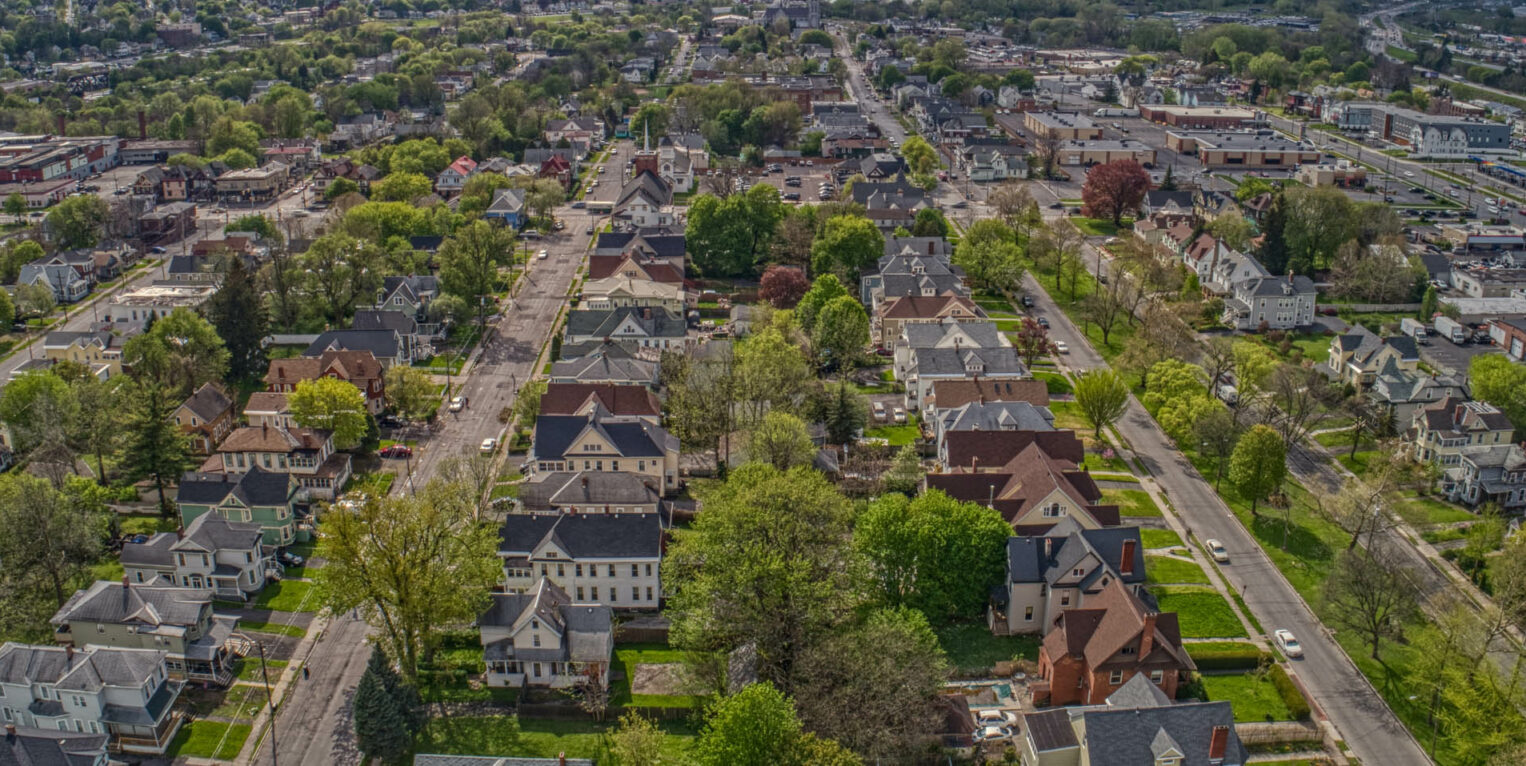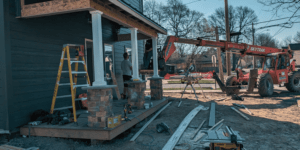
Impact Investing
Our community faces urgent challenges such as poverty, inequality and a shortage of safe, affordable housing. Neither government nor philanthropy are equipped to solve these problems alone. At the Community Foundation, we are working to make Central New York a vibrant community with equal access to opportunity for everyone. To help us get there, we have implemented a new tool called impact investing to help create transformational change.
Impact investing allows us to use our financial resources to make investments that generate both financial returns and positive social outcomes. In 2023, our board of directors approved a policy that allows us to use up to 5% of our main investment pool for the purpose of local impact investment.
In traditional investing, the main goal is to maximize financial returns. Impact investing’s primary aim is to provide sustainable long-term benefit to the community while preserving capital and attaining a modest financial return. We engage in this practice by carefully selecting opportunities such as loans, equity investments, guarantees or recoverable grants that align with our mission and contribute to the betterment of Central New York.
Our investments are designed to tackle a wide range of community needs with an emphasis on the following Community Foundation priorities:
- Helping Central New York residents build wealth
- Equipping residents with the opportunity to contribute to the economic performance of the region
- Providing under-resourced communities and nonprofit organizations access to capital
By leveraging financial resources and investing in organizations and projects that align with our mission, we are able to make the most of our capital assets while contributing to the long-term well-being and development of our community.
Our Impact Investments
$3.61M
invested in region
$25.9M
leveraged for home loans
$37.6M
leveraged for personal, business & other loans
Current Investment Profiles

In 2019, the Community Foundation committed a $500,000 Program Related Investment (PRI) through its LeadSafeCNY initiative to Home HeadQuarters (HHQ). The PRI acts as a loan loss reserve to backstop any losses on first mortgages HHQ would provide to new, first-time homebuyers in the city of Syracuse. This has played a crucial role in HHQ’s mission to enhance homeownership opportunities and transform neighborhoods.
Our impact investment to HHQ was in the form of a loan loss reserve that helped guarantee loans provided to 44 homebuyers purchasing homes in some of Syracuse’s most under-resourced neighborhoods. Should a mortgage result in foreclosure, HHQ would assume the property and loan, make renovations and resell the property. If the sale resulted in a loss, the Community Foundation would provide HHQ with funds from the loan loss reserve to cover any shortfall. HHQ used our reserve commitment to leverage $4.3 million in loan capital from banks and credit unions.
The loan loss reserve provided enough funds to guarantee 45 home purchase loans. These loans, averaging around $100,000 each, have injected over $4 million of capital into neighborhoods, helping aspiring homeowners transition from being renters to proud property owners. So far, none of the loans have gone into default, thanks in part to HHQ’s homebuyer education program that provides new owners with the skills and knowledge necessary to maintain their mortgages in good standing.
The loan loss reserve was set up to guarantee first mortgages made to homebuyers in and around census tracts 54 and 23, encompassing zip codes 13205 and 13203. These areas are affected by poverty, high unemployment, high rates of childhood lead poisoning and stagnant housing values due to public and private disinvestment, racist urban planning and housing policies, and racial inequity. According to HHQ officials, this approach ensured that they, along with city planners, are creating stable neighborhoods and an improved quality of life for residents living with fewer access to opportunity.
Buyers have been first-time homeowners coming out of public housing or rental properties. Eighty percent of program participants are individuals from historically excluded and under-banked communities. Many face challenges in accessing traditional bank financing due to lower credit scores, higher debt ratios and depressed property values in neighborhoods suffering from years of disinvestment. HHQ’s program is leveling the playing field and empowering individuals to achieve their dream of homeownership.
While HHQ has originated all of the first mortgage loans to be guaranteed by our initial PRI, organization leaders hope to scale up the success of this pilot program through additional PRIs to guarantee both first mortgage, home improvement and small business financing. We are proud to partner with HHQ to foster social and economic equity and help transform neighborhoods into stable, owner-occupied communities.
Our impact investing program provides sustainable long-term benefit to the community while preserving capital and attaining a modest financial return. We engage in this practice by carefully selecting opportunities such as loans, equity investments, guarantees or recoverable grants that align with our mission and contribute to the betterment of Central New York. Learn more at cnycf.org/impactinvesting.

The Community Foundation’s first impact investment was established to support Cooperative Federal (Coop Fed). Coop Fed, a nonprofit credit union and a certified Community Development Financial Institution, is using the $250,000 secondary capital loan over a ten-year term to enhance its capital ratio and thereby expand lending in the Syracuse community. This allows them to provide more loans to first-time homebuyers, micro-businesses, and individuals seeking personal financing.
Since the initial investment, which included Community Foundation dollars and donor-advised fundholder support, Coop Fed has granted a total of $59.2 million in loans to local residents and businesses. The majority of these loans, approximately 80%, have served low and moderate-income communities, including first-time homebuyers and minority- or women-owned business enterprises (MWBE). More than a third benefited those living in high poverty neighborhood census tracks. Looking ahead, Coop Fed expects to reach at least $88 million in new loans by 2026.
Cooperative Federal is dedicated to fostering economic justice, financial strength and reinvestment in Syracuse neighborhoods. Its members are historically underbanked and live and work in disinvested communities. More than half of their members do not have a credit score at all or score below 600 when they first join the credit union, making it harder for them to qualify for loans. Coop Fed’s community development model combines counseling, technical assistance and education with financial tools such as mortgages, loans and account services to help its members reach their goals and build financial stability.
Our impact investment with Cooperative Federal is magnifying their community impact several times over. For those who struggle to buy homes, build businesses or even afford cars, the loans are a lifeline; they deliver first opportunities and second chances. Our partnership is driving economic growth and empowering individuals to overcome adversity, paving the way for a more equitable and prosperous future for Central New York residents.
Our impact investing program provides sustainable long-term benefit to the community while preserving capital and attaining a modest financial return. We engage in this practice by carefully selecting opportunities such as loans, equity investments, guarantees or recoverable grants that align with our mission and contribute to the betterment of Central New York. Learn more at cnycf.org/impactinvesting

Pathfinder Bank’s new Southwest Branch opened in November 2022 to provide new opportunities to local residents who have historically not had sufficient access to retail banking. The company’s leadership intentionally chose to settle in an area that had experienced disinvestment and lacked sufficient financial services and education.
Located in a renovated century-old mansion on West Onondaga Street on the Westside of Syracuse, the new branch sits in one of Syracuse’s poorest census tracts – 65% are living below the poverty line and the median household income is $18,300. The physical proximity of the new branch allows community members to easily access banking services without needing vehicles or traveling long distances.
In order for the branch to be successful, it needed to meet a certain threshold of deposits within a specific timeframe. Understanding the impact this new development can have on the community, the Community Foundation made a $500,000 deposit. Our investment helped Pathfinder leverage additional investments and deposits that set the bank off on the right foot within its first few months.
The new branch offers specialized services for those facing financial challenges such as interest-bearing business checking accounts along with checking accounts with low or no cost that eliminate worries about overdrafts. Free financial literacy classes that teach people budgeting, basic banking and how to establish credit are also in the works.
What strikes the branch’s representatives most, though, are the personal connections they have been able to make. They are witnessing new small businesses attain funding that they may have struggled to receive before and customers being happy to find bank representatives who they can relate to.
Pathfinder’s new Southwest Branch is helping to transform the narrative of a neighborhood and foster a thriving and inclusive financial ecosystem where it is needed most.
Our impact investing program provides sustainable long-term benefit to the community while preserving capital and attaining a modest financial return. We engage in this practice by carefully selecting opportunities such as loans, equity investments, guarantees or recoverable grants that align with our mission and contribute to the betterment of Central New York. Learn more at cnycf.org/impactinvesting
How to Co-Invest
Up to five percent of our main investment pool can be used for the purpose of local impact investment. So if you have a participating fund, you are already helping support this work. You may also be able to make an additional charitable investment with your donor-advised fund’s assets and receive return on principal, possibly with interest, to achieve both financial and social returns. To learn more, contact Pragya Murphy at pmurphy@cnycf.org or 315.883.5540.
How to Receive Funding
Nonprofit organizations serving the Central New York region may be eligible to receive impact investments in the form of loans, equity investments, guarantees and recoverable grants. To learn more, contact Frank Ridzi at fridzi@cnycf.org or 315.883.5553.
Frequently Asked Questions
Community challenges are complex and often require resources beyond the reach of grantmaking. There is a larger need for capital than what the private market will provide. Impact investing has the potential to create long lasting and systemic changes that will benefit our community for years to come by targeting programs that would not happen without our capital.
With impact investing, money circles back to the Community Foundation with a modest return, so dollars can be deployed back into the community. We will ensure that these new efforts align with and complement our continuing work in grantmaking. The allocation of these resources will have little to no impact on our grantmaking budget.
Our staff is very familiar with the nonprofit organizations in this community working across a broad spectrum of interest areas. In some cases, we approach nonprofits to explore investment opportunities. In other cases, we are approached with specific opportunities for consideration. If you are a nonprofit organization looking to learn more, contact Frank Ridzi at fridzi@cnycf.org or 315.883.5553.
Our staff will first be responsible for preliminary due diligence. Then, the Local Impact Investment Committee, a subcommittee of our board of directors, will follow board-approved guidelines and policies to conduct due diligence and underwriting to help mitigate risk. Committee members are local leaders with expertise relevant to the practice of local investing. Ultimately, our board of directors will approve all investment decisions. Staff will produce financial and impact status reports for the committee and board.
Our prospective investment scorecard outlines twelve dimensions of success that each opportunity is evaluated against. This internal screening tool will help determine whether an investment is a good fit and what, if any, additional due diligence or underwriting is needed. The scorecard evaluates dimensions such as social return, management and financial capacity, and financial return.
Our board of directors approved the use of up to 5% of the Community Foundation’s main investment pool for the purpose of local impact investment.
Our staff, board and Local Impact Investment Committee, comprised of local leaders with expertise relevant to the practice of local investing, will conduct due diligence and underwriting on investments to identify and document risks and suggest mitigation strategies. We also utilize legal counsel to review documents, transactions, agreements and legal structures.
While careful due diligence and working with proven organizations will mitigate defaults, we recognize that this is a possibility. It is our policy to carefully monitor and revise terms or conditions to avoid defaults or investment losses. However, if a borrower defaults, the Local Impact Investment Committee will determine whether there is appropriate recourse from the borrower or any of its guarantors.
Our staff and the Local Impact Investment Committee will determine the appropriate impact measures for each investment. Most will require periodic reports of both social outcomes and financial results.
Our impact investments will target programs that would not happen without our capital. Local banks and other financial intermediaries are considered partners, not competitors.







